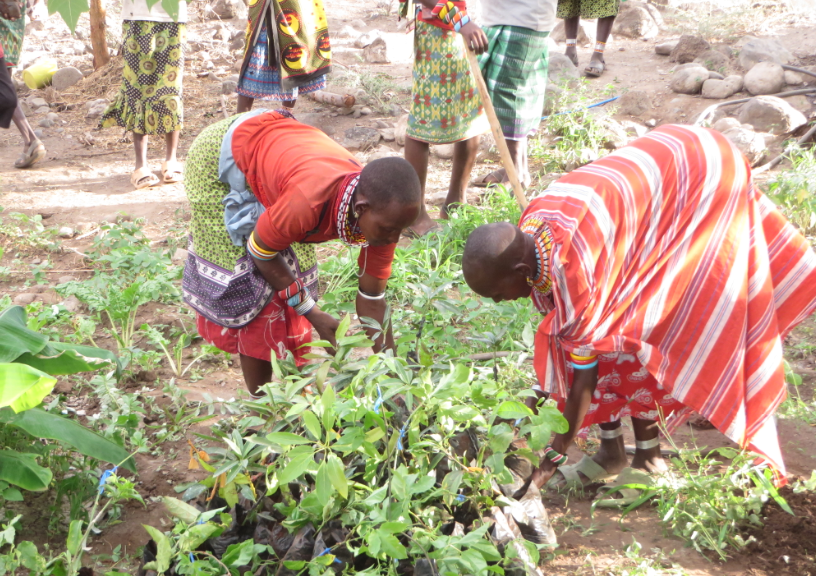Diversification des moyens de subsistance
Des femmes arrangent des plants de fruits dans leur jardin communautaire de fruits et légumes dans le village d'Arapal, Mt. Kulal.
VSF Germany
Le programme a utilisé deux stratégies principales pour la diversification des moyens de subsistance afin d'améliorer les revenus et la nutrition des ménages :
- La promotion de la banque communautaire villageoise (VICOBA) basée sur des groupes de femmes dans une approche qui encourage la micro-épargne et l'emprunt pour renforcer la sécurité financière et promouvoir les affaires, en particulier le commerce de petits stocks.
- Identification des villages disposant de ressources en eau suffisantes et introduction de jardins potagers et fruitiers communautaires partagés afin d'améliorer la nutrition (fournir une source alternative de vitamines) dans une région souffrant d'une grave pénurie de fruits et légumes. L'organisation s'est approvisionnée en fruits et légumes auprès de l'Institut national de recherche horticole, qui a sélectionné des variétés spécialement sélectionnées pour les conditions agro-écologiques du mont Kulal. Une production réussie de fruits et légumes devrait également permettre de vendre le surplus, générant ainsi un revenu pour les ménages.
- Groupes d'épargne de femmes préexistants et désir d'épargner et de faire des affaires au sein de différents groupes dans les communautés.
- Disponibilité d'argent pour fournir des subventions de semences pour les petites entreprises d'élevage.
- Volonté des ménages pastoraux de s'engager dans la culture maraîchère à petite échelle de fruits et de légumes pour produire des légumes verts à valeur nutritionnelle.
- La disponibilité d'agents de vulgarisation agricole du comté pour aider les communautés à mettre en place des jardins potagers communautaires pilotes et les former à la production de cultures.
De nombreuses communautés et ménages purement pastoraux sont de plus en plus prêts, désireux et capables de diversifier leurs moyens de subsistance en tant que stratégie de résilience, des stratégies telles que le commerce étant les plus préférables. De même, les ménages pastoraux sont très intéressés par la culture maraîchère à petite échelle de légumes et de fruits pour produire des légumes verts, une source de vitamines rarement accessible à de nombreuses familles dans les zones arides.

